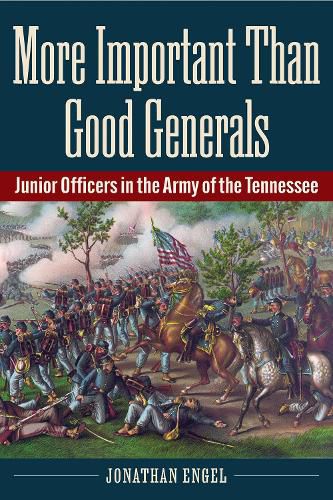Readings Newsletter
Become a Readings Member to make your shopping experience even easier.
Sign in or sign up for free!
You’re not far away from qualifying for FREE standard shipping within Australia
You’ve qualified for FREE standard shipping within Australia
The cart is loading…






The Union's forgotten mid-level officers and their commitment to the cause
More Important Than Good Generals is an in-depth study of the Army of the Tennessee's junior officers--the company and field grade lieutenants, captains, majors, lieutenant colonels, and colonels. While many studies have examined generals and common soldiers, Civil War armies' "middle management" has been largely ignored. Officers had a substantially different array of duties than the soldiers they commanded and the generals above them, resulting in a drastically different wartime experience. Moreover, it is not only Civil War officers who have been overlooked but also the army Grant and Sherman commanded--the Army of the Tennessee--despite the fact that it was one of the most victorious armies of the war.
Pushing back against the commonly accepted narrative of disillusionment among officers, Engel concludes that the Army of the Tennessee's company and field grade officers endured the war's trials with their moral and political ideology intact. Further, rather than becoming indifferent to the Union cause, Engel argues that the reverse was often true: officers who started off racist or disinterested in the issue of enslavement became advocates of emancipation.
Engagingly written and meticulously researched, More Important Than Good Generals is a lasting work of scholarship that will appeal to Civil War historians and general readers alike.
$9.00 standard shipping within Australia
FREE standard shipping within Australia for orders over $100.00
Express & International shipping calculated at checkout
Stock availability can be subject to change without notice. We recommend calling the shop or contacting our online team to check availability of low stock items. Please see our Shopping Online page for more details.
The Union's forgotten mid-level officers and their commitment to the cause
More Important Than Good Generals is an in-depth study of the Army of the Tennessee's junior officers--the company and field grade lieutenants, captains, majors, lieutenant colonels, and colonels. While many studies have examined generals and common soldiers, Civil War armies' "middle management" has been largely ignored. Officers had a substantially different array of duties than the soldiers they commanded and the generals above them, resulting in a drastically different wartime experience. Moreover, it is not only Civil War officers who have been overlooked but also the army Grant and Sherman commanded--the Army of the Tennessee--despite the fact that it was one of the most victorious armies of the war.
Pushing back against the commonly accepted narrative of disillusionment among officers, Engel concludes that the Army of the Tennessee's company and field grade officers endured the war's trials with their moral and political ideology intact. Further, rather than becoming indifferent to the Union cause, Engel argues that the reverse was often true: officers who started off racist or disinterested in the issue of enslavement became advocates of emancipation.
Engagingly written and meticulously researched, More Important Than Good Generals is a lasting work of scholarship that will appeal to Civil War historians and general readers alike.